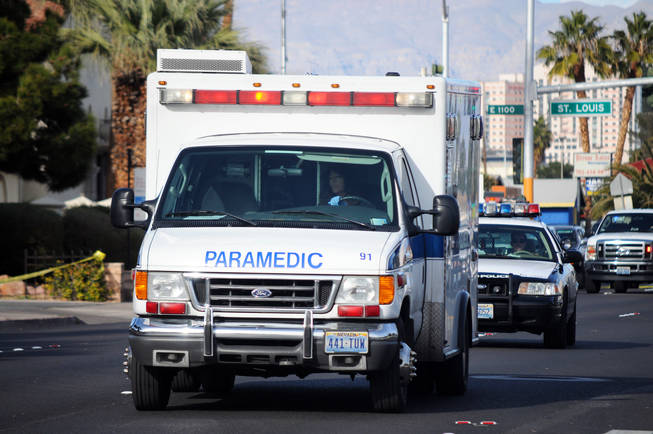
An ambulance leaves the scene of a police standoff on Phillips Avenue, near St. Louis Avenue and Maryland Parkway, Dec. 26, 2010.
Saturday, March 1, 2014 | 2 a.m.
If you’re a Las Vegas resident in need of medical care, it will be increasingly likely over the coming months that your trip to the hospital will be provided by paramedics from the city’s fire department instead of a private ambulance service.
Although Las Vegas Fire & Rescue ambulances respond to every call for medical aid in the city, they typically transport patients to the hospital about 30 percent of the time, with the rest being picked up by the city’s private contractor, American Medical Response.
Chief William McDonald says he wants to see his department pick up a greater share of those transports as a way to increase efficiency and bring in more revenue for the department.
Starting Monday, the city’s dispatch center will stop sending ambulances from both American Medical Response and the fire department to all incidents. Instead, in many cases just an ambulance from the fire department will be dispatched and responsible for transporting the patient.
“We will reduce the amount of times that we tie up two ambulances on a call that really only needs one,” he said. “It doesn’t make sense to tie up resources unnecessarily. This will free up resources that are underutilized to be able to take on other calls.”
A 2012 report from the International City/County Management Association criticized the current system of sending fire department and private ambulances to the same incidents, often leading to a needless duplication of service. The report said the city could bring in $12 million to $14 million per year in new revenue if it handles all transports internally. Alternatively, letting American Medical Response handle all transports would save the city between $14 million and $18 million annually, according to the report.
Because a fee is paid by patients for transport, the fire department stands to earn more with increased use of its ambulances. Turning over ambulance duties to American Medical Response would allow the department to get rid of its ambulances and the costs associated with them.
McDonald’s immediate goal is to have the department transport 50 percent of patients, eventually increasing that number to 75 percent of the estimated 70,000 transports needed in Las Vegas each year.
But officials at American Medical Response are raising concerns that the chief’s plan is too ambitious and would stretch the department’s resources thin.
General Manager Scott White said American Medical Response constantly has ambulances circulating the city ready to respond quickly to the nearest call, while the fire department dispatches from fixed locations. He also criticized the chief’s plan for not clearly laying out how the changes will affect response times or deployment plans.
“If the (fire) department starts taking more transports, they won’t be available for next call because they’ll be at a hospital turning that patient over,” White said. “Today our average response time is seven minutes and seven seconds. What will it be tomorrow if American Medical Response is not responding? We haven’t been able to get that level of clarity from the fire department.”
McDonald said he’s confident the department can meet the 50 percent transport goal with its current fleet of 22 ambulance units. Going up to 75 percent might require more staffers, but McDonald said the cost would be offset by revenue from increased transports.
McDonald said the city’s contract with American Medical Response doesn’t specify a minimum or maximum number of transports the company will receive, brushing aside complaints from White that the shift in policy could violate the terms of that agreement.
“The council took an action back in the late 1990s to authorize the fire department to do (transports),” McDonald said. “It’s my opinion that we’re the primary provider of pre-hospital care services.”

Join the Discussion:
Check this out for a full explanation of our conversion to the LiveFyre commenting system and instructions on how to sign up for an account.
Full comments policy